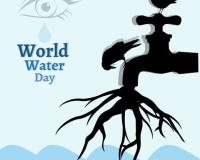
. . . . . . . . . . . . . . . . World water day . . . . . . . . . . . . . .
Today, March 22, World Water Day is celebrated, an anniversary established by the United Nations in 1992 as part of the directives of Agenda 21, the result of the Rio conference.
This year's theme is the link between water and climate change. The aim of the day is to sensitize world institutions and public opinion on the importance of reducing water waste and adopting behaviors aimed at combating climate change.
Water shortages were the fifteenth leading cause of death in the world (fifth in sub-Saharan Africa) and killed 1.2 million people. To hold this sad record is none other than the lack of access to sources of drinking water, a factor that is also decisive in the increase of infectious diseases such as cholera and hepatitis.
A precious asset that we must preserve and not waste! One of the most precious resources on this planet! Small daily gestures are enough.
It is essential to be aware and active, by transposing scientific knowledge on a political level, on the fact that improving, or even maintaining, the current levels of achievement of sustainable goals are intrinsically linked to water and climate change. In fact, water-related hazards represent 90% of all-natural hazards and their frequency and intensity are generally increasing.
Water is also a good part of the solution: better management of water resources in a sustainable way is an essential component for the success of climate mitigation and adaptation strategies.
Improving water management practices can help increase resistance to climate variables, improve the health of ecosystems and reduce the risk of water-related disasters.
On March 22 of each year, the states that sit within the General Assembly of the United Nations are invited to promote actions for the protection of water, therefore they are called to facilitate concrete activities in their respective countries.
Since 2005, several Non-Governmental Organizations have taken inspiration from this day to direct public attention to the delicate issue of water in modern times; among the various implications, access to fresh water and the sustainability of aquatic habitats have been placed under the magnifying glass.
A problem that still affects 771 million people.
In the last hundred years, water consumption has increased sixfold in the Western world, but not in the poorest countries, where access to water has increasingly become a mirage. Let's prevent water from becoming a financial asset.
Climate finance for water management supports community climate resilience, job creation and is a vital support for improving sustainable development outcomes.
Out of sight, under our feet, the water table is a hidden treasure that enriches our life. In the driest parts of the world, it may be the only water people have. Almost all of the world's liquid freshwater is underground, which supports the supply of drinking water, health systems, agriculture, industry, and ecosystems. Groundwater will play a key role in adapting to climate change. We must work together to sustainably manage this precious resource.
The vital role of groundwater in water and sanitation systems, agriculture, industry, ecosystems, and the adaptation to climate change of our earth must be reflected in the definition of sustainable development policies.
On March 22 of each year, the states that sit within the General Assembly of the United Nations are invited to promote actions for the protection of water, therefore they are called to facilitate concrete activities in their respective countries.
Giuseppe Nunziato Belcastro - MedAmbiente - Citizens of the World Let's Unite!
